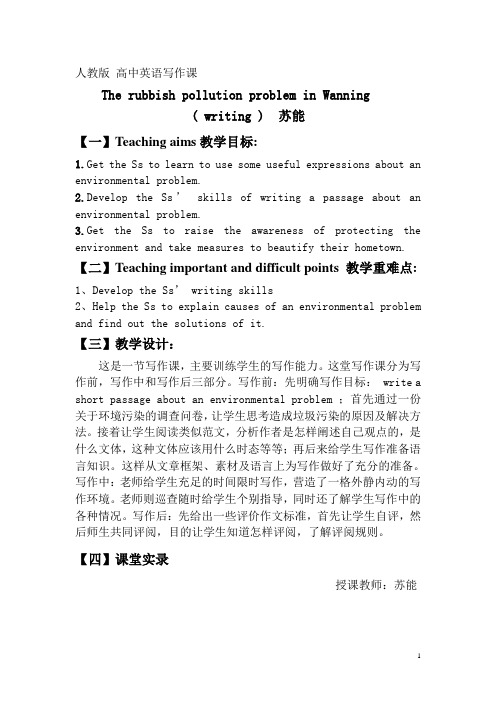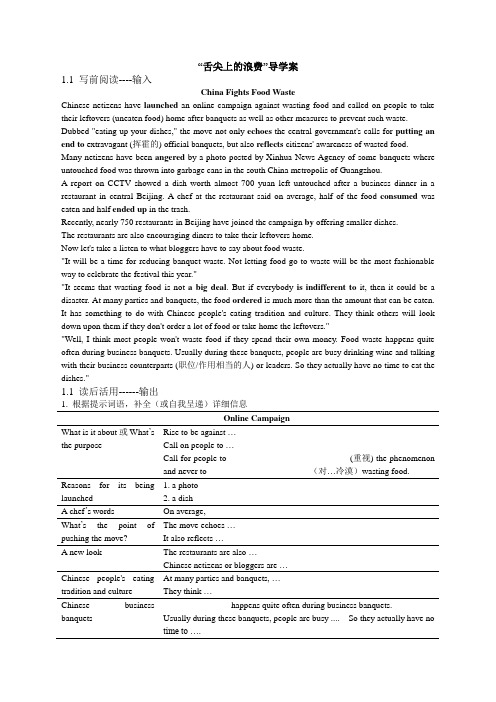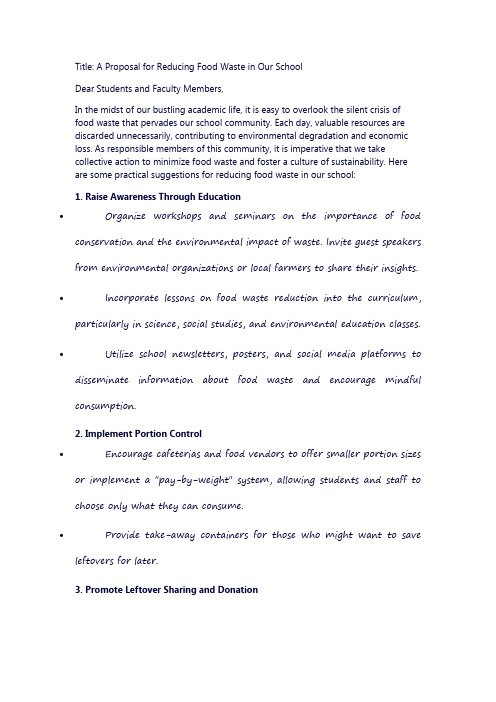高三英语写作专题 “舌尖上的浪费”写作教学设计
高中英语写作课教学设计

人教版高中英语写作课The rubbish pollution problem in Wanning( writing ) 苏能【一】Teaching aims教学目标:1.Get the Ss to learn to use some useful expressions about an environmental problem.2.Develop the Ss’skills of writing a passage about an environmental problem.3.Get the Ss to raise the awareness of protecting the environment and take measures to beautify their hometown. 【二】Teaching important and difficult points 教学重难点:1、Develop the Ss’ writing skills2、Help the Ss to explain causes of an environmental problem and find out the solutions of it.【三】教学设计:这是一节写作课,主要训练学生的写作能力。
这堂写作课分为写作前,写作中和写作后三部分。
写作前:先明确写作目标: write a short passage about an environmental problem ;首先通过一份关于环境污染的调查问卷,让学生思考造成垃圾污染的原因及解决方法。
接着让学生阅读类似范文,分析作者是怎样阐述自己观点的,是什么文体,这种文体应该用什么时态等等;再后来给学生写作准备语言知识。
这样从文章框架、素材及语言上为写作做好了充分的准备。
写作中:老师给学生充足的时间限时写作,营造了一格外静内动的写作环境。
老师则巡查随时给学生个别指导,同时还了解学生写作中的各种情况。
《餐桌上的浪费》 课题教学设计

《餐桌上的浪费》课题教学设计1.课题分析本课题系教育部统编教材义务教育教科书,人民教育出版社《道德与法治》四年级下册第二单元主题《做聪明的消费者》第三分题《有多少浪费本可避免》第一课时内容。
位于教材第44页至第48页。
《有多少浪费本可避免》是本单元的第三分题,本分题共涉及了两课,课题分别是《餐桌上的浪费》、《还有哪些浪费可以避免》。
随着我国国民经济的发展和人民生活水平的提高,我国居民消费观念发生了转变,社会上出现一些不良习气,铺张浪费的现象严重。
除了居民消费领域之外,其他领域也都有着惊人的浪费。
严重的浪费不仅消耗了大量的资源,造成了严重的污染,而且对个人精神和社会风气产生腐蚀作用。
本节课引导学生了解浪费的严重危害,认识到厉行节约、反对浪费的必要性。
《餐桌上的浪费》首先从餐桌食物浪费入手,引导学生正视自己和他人的浪费现象,认识食物浪费的严重后果,引导学生从自身做起,从小事做起,做到节约食物、拒绝浪费。
最终形成反对浪费、提倡节俭的共识,养成勤俭节约的好习惯。
2.学情分析四年级孩子对节约、浪费有较准确的判断,但因受到家庭教育、社会风气等生活环境的影响,养成了一些节约或浪费的习惯。
随着年龄的增长,攀比、爱面子等因素也会助长孩子们向着浪费的方面发展,而他们的自我认识与社会教育局限,基于他们的生活经验在这些方面还有所欠缺,如何更好地引导学生合理消费、传承中华民族勤俭节约的美德是当务之急。
3.教学目标知识目标:了解餐桌上的浪费有哪些表现,认识浪费粮食所带来的消极影响,学会节约粮食。
能力与方法目标:能够通过自己的观察发现生活中的粮食浪费现象,明白资源和能源都是有限的,能够节约粮食,避免浪费。
情感态度价值观目标:体会“ 光盘行动”的意义,树立节约粮食的观念,培养勤俭节约的美德。
4.教学要点教学重点:(1)了解餐桌上的浪费有哪些表现,认识浪费粮食所带来的消极影响。
(2)学会节约粮食。
教学难点:树立节约粮食的观念,培养勤俭节约的美德。
高中英语“舌尖上的浪费”导学案

“舌尖上的浪费”导学案1.1 写前阅读----输入China Fights Food WasteChinese netizens have launched an online campaign against wasting food and called on people to take their leftovers (uneaten food) home after banquets as well as other measures to prevent such waste. Dubbed "eating up your dishes," the move not only echoes the central government's calls for putting an end to extravagant (挥霍的) official banquets, but also reflects citizens' awareness of wasted food. Many netizens have been angered by a photo posted by Xinhua News Agency of some banquets where untouched food was thrown into garbage cans in the south China metropolis of Guangzhou.A report on CCTV showed a dish worth almost 700 yuan left untouched after a business dinner in a restaurant in central Beijing. A chef at the restaurant said on average, half of the food consumed was eaten and half ended up in the trash.Recently, nearly 750 restaurants in Beijing have joined the campaign by offering smaller dishes.The restaurants are also encouraging diners to take their leftovers home.Now let's take a listen to what bloggers have to say about food waste."It will be a time for reducing banquet waste. Not letting food go to waste will be the most fashionable way to celebrate the festival this year.""It seems that wasting food is not a big deal. But if everybody is indifferent to it, then it could be a disaster. At many parties and banquets, the food ordered is much more than the amount that can be eaten. It has something to do with Chinese people's eating tradition and culture. They think others will look down upon them if they don't order a lot of food or take home the leftovers.""Well, I think most people won't waste food if they spend their own money. Food waste happens quite often during business banquets. Usually during these banquets, people are busy drinking wine and talking with their business counterparts (职位/作用相当的人)or leaders. So they actually have no time to eat the dishes."1.1 读后活用------输出1. 根据提示词语,补全(或自我呈递)详细信息Online CampaignWhat is it about或What’s the purpose Rise to be against …Call on people to …Call for people to ___________________________ (重视) the phenomenon and never to ______________________ (对…冷漠)wasting food.Reasons for its being launched 1. a photo2. a dishA chef’s words On average,What’s the point of pushing the move? The move echoes …It also reflects …A new look The restaurants are also …Chinese netizens or bloggers are …Chinese people's eating tradition and culture At many parties and banquets, …They think …Chinese business banquets _______________ happens quite often during business banquets.Usually during these banquets, people are busy .... So they actually have no time to ….2. Guess the meaning of the words from the context. 我能从上下文猜出词或词语的含义。
餐桌上的浪费教学设计

《餐桌上的浪费教学设计》一、教学背景随着社会经济的发展和人民生活水平的提高,餐桌上的浪费现象日益严重。
这种浪费不仅造成了资源的极大浪费,也与我国倡导的勤俭节约、绿色环保的理念相悖。
在学校教育中,加强对学生进行餐桌浪费意识的培养和行为习惯的养成教育,具有重要的现实意义。
通过本次教学设计,旨在引导学生认识到餐桌上浪费的危害,培养他们珍惜粮食、节约资源的良好习惯和意识,树立正确的价值观和消费观。
二、教学目标1. 知识与技能目标- 让学生了解餐桌上浪费的主要表现形式,如食物剩余、随意丢弃等。
- 掌握节约粮食的方法和技巧,如合理点餐、适量取餐、不挑食等。
- 培养学生观察、分析和解决问题的能力,能够在日常生活中自觉抵制餐桌浪费行为。
2. 过程与方法目标- 通过课堂讨论、案例分析、小组活动等形式,引导学生积极参与,提高学生的思维能力和表达能力。
- 运用多媒体教学手段,如图片、视瓶等,增强教学的直观性和趣味性,激发学生的学习兴趣。
- 组织学生进行实地调查和实践活动,让学生亲身体验节约粮食的重要性,增强学生的实践能力和社会责任感。
3. 情感态度与价值观目标- 培养学生的勤俭节约意识,让学生懂得珍惜劳动成果,尊重他人的劳动。
- 树立学生的绿色环保观念,认识到节约资源与保护环境的密切关系,增强学生的社会责任感。
- 培养学生的团队合作精神和社会交往能力,通过小组活动和社会实践,让学生学会与他人合作,共同解决问题。
三、教学重难点1. 教学重点- 让学生认识到餐桌上浪费的危害,树立节约粮食的意识。
- 掌握节约粮食的方法和技巧,培养学生良好的饮食习惯和行为习惯。
2. 教学难点- 如何引导学生将节约粮食的意识转化为实际行动,在日常生活中自觉抵制餐桌浪费行为。
- 如何培养学生的社会责任感,让学生不仅自己做到节约粮食,还能够影响和带动身边的人共同参与到节约粮食的行动中来。
四、教学方法1. 讲授法- 讲解餐桌上浪费的危害、节约粮食的方法和技巧等知识,使学生系统地了解相关内容。
英语作文关于学校浪费粮食的建议书

Title: A Proposal for Reducing Food Waste in Our SchoolDear Students and Faculty Members,In the midst of our bustling academic life, it is easy to overlook the silent crisis offood waste that pervades our school community. Each day, valuable resources are discarded unnecessarily, contributing to environmental degradation and economic loss. As responsible members of this community, it is imperative that we takecollective action to minimize food waste and foster a culture of sustainability. Here are some practical suggestions for reducing food waste in our school:1. Raise Awareness Through Education•Organize workshops and seminars on the importance of food conservation and the environmental impact of waste. Invite guest speakers from environmental organizations or local farmers to share their insights.•Incorporate lessons on food waste reduction into the curriculum, particularly in science, social studies, and environmental education classes.•Utilize school newsletters, posters, and social media platforms to disseminate information about food waste and encourage mindful consumption.2. Implement Portion Control•Encourage cafeterias and food vendors to offer smaller portion sizes or implement a "pay-by-weight" system, allowing students and staff to choose only what they can consume.•Provide take-away containers for those who might want to save leftovers for later.3. Promote Leftover Sharing and Donation•Establish a "Food Recovery Program" where edible leftovers from cafeterias and events are collected and distributed to local food banks or shelters.•Encourage students to share their meals or plan group meals to reduce individual portions and avoid over-ordering.4. Encourage Mindful Eating Habits•Promote the practice of being present and mindful while eating, encouraging students to assess their hunger levels before ordering and to eat slowly, savoring every bite.•Educate students on the nutritional value of food and how to make informed choices that align with their dietary needs and preferences.5. Utilize Technology for Monitoring and Feedback•Implement technology solutions, such as mobile apps or online surveys, to gather feedback on cafeteria offerings and adjust menus accordingly to reduce waste.•Use smart sensors or visual indicators in trash bins to monitor food waste levels and identify areas for improvement.6. Celebrate Waste-Free Initiatives•Recognize and reward students, teachers, and staff who demonstrate exceptional efforts in reducing food waste through awards, certificates, or public recognition.•Organize events or challenges, such as "Zero Waste Week," to engage the entire school community in reducing food waste and fostering a culture of sustainability.In conclusion, reducing food waste in our school is not just a matter of economics or environmental responsibility; it is a reflection of our values as a communitycommitted to sustainability and social responsibility. By implementing thesesuggestions, we can collectively make a significant impact, not only on our immediate environment but also on the future generations who will inherit this planet. Let us work together towards a waste-free future, starting with our school.Sincerely,[Your Name][Your Position/Grade][School Name]。
雅思写作外教范文:浪费食物的原因和解决方

雅思写作外教范文:浪费食物的原因和解决方
近些年来,食物浪费成为比以往更加突出的社会问题,它不仅给社会带来了经济损失,也不公平地对待那些因饥饿而无法抵御的人们。
那么,造成食物浪费的原因到底有哪些?
我们应该如何来解决这一问题?
造成食物浪费的原因可以从三个主要方面划分:首先,一些食品和物资供应商会为了
赚钱而不节俭,比如用大量包装来掩盖低质量食物。
此外,食物在运输和出售过程中也很
容易损坏,当它们由于质量问题而被抛弃时,就会带来大量的损失。
最后,大多数消费者
也没有节俭,他们购买过多的食物,但最终把大多数都丢掉。
要解决食物浪费问题,需要采取几项关键的措施。
首先,应从政策立场改革食品供应商,提倡节俭办事,对于大量包装和质量不佳的产品做相应的处理。
其次,政府应提供更
多的免费帮助服务,以便帮助那些因贫穷而无法购买食物的人们。
最后,政府也应该在社
会上进行反食物浪费的宣传,教育人们节约食物的重要性。
总的来说,食物浪费不仅给社会造成巨大损失,而且也违反了公平正义的原则。
因此,应通过制定立法、加强宣传以及提供帮助的方式,来共同努力,让更多没有足够的饮食和
住房的人们能够获取到充足的饮食和住房。
这将有助于改善社会经济状况,同时减少社会
不公现象。
高中英语写作教学设计
高中英语写作教学设计一、教学任务及对象1、教学任务本教学设计的主要任务是针对高中学生进行英语写作能力的提升。
通过系统化的教学策略和过程,使学生掌握英语写作的基本技巧和方法,培养他们的创意思维和逻辑表达能力。
教学内容包括但不限于:写作规范、句子结构、段落构思、文章组织、修辞手法等,旨在帮助学生写出内容丰富、结构清晰、语言准确的英语文章。
2、教学对象本教学设计的对象为高中阶段的学生,他们已经具备一定的英语基础,能够运用基本的语法知识进行英语表达。
然而,在写作方面,学生们的水平参差不齐,部分学生存在思路混乱、表达不清、语法错误等问题。
因此,在教学过程中,需要针对不同水平的学生进行有针对性的指导,使他们在英语写作上取得明显的进步。
同时,注重培养学生的自主学习能力和团队合作精神,使他们能够在英语写作过程中不断反思和提升。
二、教学目标1、知识与技能(1)掌握英语写作的基本规范,如文章格式、标点符号使用等;(2)学会运用不同的句子结构表达观点,提高句子的连贯性和表达效果;(3)掌握文章的基本结构,包括引言、正文和结尾,并能够运用适当的过渡句使文章连贯;(4)学会运用不同的段落构思方法,如列举、对比、因果等,丰富文章内容;(5)掌握一定的修辞手法,如比喻、拟人等,提高文章的表现力和吸引力;(6)提高词汇和语法运用能力,减少语言错误,使文章更加准确、地道。
2、过程与方法(1)通过课堂讲解、案例分析、讨论交流等形式,让学生了解和掌握英语写作的基本技巧;(2)采用以退为进的教学策略,引导学生从简单的句子、段落入手,逐步提高写作水平;(3)以点带面,通过典型例句、例文的分析,帮助学生总结写作规律,形成自己的写作风格;(4)鼓励学生进行小组合作,互相评改作文,提高学生的批判性思维和团队协作能力;(5)利用现代化教学手段,如网络资源、多媒体等,为学生提供丰富的学习材料和实践机会;(6)注重写作过程的指导,引导学生进行构思、草稿、修改等环节,培养良好的写作习惯。
舌尖上的浪费
舌尖上的浪费/光盘行动范文According to reports, the leftovers in restaurants across the country are almost enough to feed 200 million people annually. Therefore, China has taken on a national campaign “Eat up all on the Plates”.It is a tradition for most people in China to entertain their guests with more than enough food, believing that they have not satisfied their guests if there is no need left on the table, which they think is a good way to show their hospitality. They think they will be looked down upon if they make a doggie bag of the leftovers. As a result, restaurant trashcans are often found full of leftover foods, with full plates untouched.The “Eat up all on the Plates” campaign is intended to reduce the waste and raise people’s awareness. It has been warmly welcomed with positive responses. As middle school students, we should do our bit to say “No” to food waste, and try to develop the habit of never ordering or cooking more than what we need so as to save our limited food resources, on which we depend for a better life.Chinese Dream"Chinese Dream" has become a hot topic among Chinese people. According to a recent survey by CCTV, different groups of people have different dreams.Urban residents dream of having easy access to modern transportation so that life will be easier and more convenient. Besides, they hope to enjoy a better living environment and more public facilities. What college students are mainly concerned about is employment. So their dream is to have well-paid jobs where they can bring their potentials into full play.Meanwhile, they hope the government will strengthen its supervision over food so that people can have more polution-free and green food. As for the farmers, they hope that they can enjoy good and affordable medical care and their children can receive a good education.As far as I am concerned, my dream is to be enrolled by a good university and be a talent who can make contributions to my country. Besides, I dream there to be practical reforms in education so that high school students have enough time to sleep and exercise.。
英语写作课教学设计
英语写作课教学设计English Writing Class Lesson PlanI。
ObjectivesKnowledge objectives:1.Understand the requirements of written n and learn to complete a series of tasks within a set time frame。
including understanding the topic。
determining the writing style。
identifying key points。
organizing language。
XXX.2.Learn to express XXX。
XXX。
XXX.XXX:Improve students' XXX.II。
Teaching Aids: MultimediaIII。
Teaching Process:I。
Lead-inThe purpose of the lead-in is to arouse interest。
create a mood。
and XXX.1.Ask students to answer the following ns:What is pocket money?Do you have pocket money?2.n in groups of four on the following topic:How do we deal with our pocket money?XXX。
XXX into the role and express their own ns on how to use pocket money。
Students will be divided into groups of four。
and the teacher will supervise and provide assistance as needed。
材料作文“舌尖上的浪费”“光盘行动”导写
材料作文“舌尖上的浪费”“光盘行动”导写作者:张国学来源:《作文与考试·高中版》 2013年第13期文题阅读下面的文字,根据要求作文。
据有关部门数据统计:不论机关单位的公款招待,还是民间的私人庆典,我国每年在“舌尖上的浪费”数量巨大,至少有800万吨食物蛋白和300万吨脂肪被白白丢掉一等于浪费掉了2.5亿到3亿人一年的口粮,这已成为我们国家不堪承受之重。
在2013年1月22日召开的十八届中央纪委二次全会上,习近平总书记告诫各级领导干部:“要坚持勤俭办一切事业,坚决反对讲排场比阔气,坚决抵制享乐主义和奢靡之风。
要大力弘扬中华民族勤俭节约的优秀传统,大力宣传节约光荣、浪费可耻的思想观念,努力使厉行节约、反对浪费在全社会蔚然成风。
”要求:请以“舌尖上的浪费”或“光盘行动”为话题,写一篇作文。
写作指导这是一道材料话题作文,举凡以下关于“俭朴”方面立意角度,均可以据之构思成文,发表主张见解:1.俭朴是中华民族的传统美德,什么时候也不能丢弃;2.养成俭朴的良好生活习惯,益国益民并有助于社会的健康而快速发展;3.杜绝铺张浪费风气,弘扬勤俭节约精神,要从现在做起,从我做起;4.俭朴并不等于吝啬,我们要树立健康的消费观、价值观……例文中国式的“剩宴”宫常好个“舌尖上的浪费”,作文话题是条点击率不逊于“神马都是浮云”的网上热语。
何谓“舌尖上的浪费”?这应该是“具有中国特色”的“剩宴”吧——不含酒水五六千元一桌的宴席餐毕,几乎没动过的螃蟹、整只鸡、整条鱼都被扔掉。
如果说“舌尖上的中国”是道美丽的风景,能给国人无限遐想的话,那么,“舌尖上的浪费”则是丑陋的毒瘤,令人触目惊心,深思警醒。
有关数据显示,我国每年浪费食物总量折合粮食约500亿公斤,接近全国粮食总产量的十分之一。
即使按保守推算,每年最少倒掉约两亿多人一年的食物或口粮。
与此同时,我国还有一亿多农村扶贫对象、几千万城市贫困人口以及其他为数众多的困难群众。
- 1、下载文档前请自行甄别文档内容的完整性,平台不提供额外的编辑、内容补充、找答案等附加服务。
- 2、"仅部分预览"的文档,不可在线预览部分如存在完整性等问题,可反馈申请退款(可完整预览的文档不适用该条件!)。
- 3、如文档侵犯您的权益,请联系客服反馈,我们会尽快为您处理(人工客服工作时间:9:00-18:30)。
I’ll say ‘No’ to food waste. I’ll never over-order food at restaurant.
On dining table, I’ll pack food left as much as I can.
Waste is shameful. I’ll fight it. I’m on the Guangpan tribe. I’ll eat up the dishes.
பைடு நூலகம்
home 4. Encourage diners to take leftovers home
1. Call on people to take leftovers home after banquets.
2. Call for people to value grain. 3. Make laws to protect grain. 4. Awake people’s sense of social
1. Hospitable 2. Show off one’s wealth 3. Be afraid to be seen as stingy and lose
face 4. Have no sense of starvation 5. Think it is not a big deal 6. Fear that you will be looked down upon
friends or relatives through our action. 7. Feel ashamed or feel guilty if we waste
food. 8. Have a sense of starvation.
1. Awaken people’s awareness of saying no to food waste.
2. Form an atmosphere of making people feel guilty about leaving food on their plates
3. Awaken people sense of social responsibility.
4. Make people stress the importance of rising to be against food waste.
1. Put on the dining table a sign that reads “Clean your plates” or “Eat up your dishes.”
2. Offer smaller dishes 3. Remind diners of taking uneaten food
responsibility. 5. Call on people never to be indifferent to
food waste.
1. Never overorder food at restaurant. 2. Always pack leftovers as much as I can. 3. Say no to food wasteful spending. 4. Put up posters related to food protection. 5. Take the lead and make others follow suit. 6. Exert impact on our family members,
